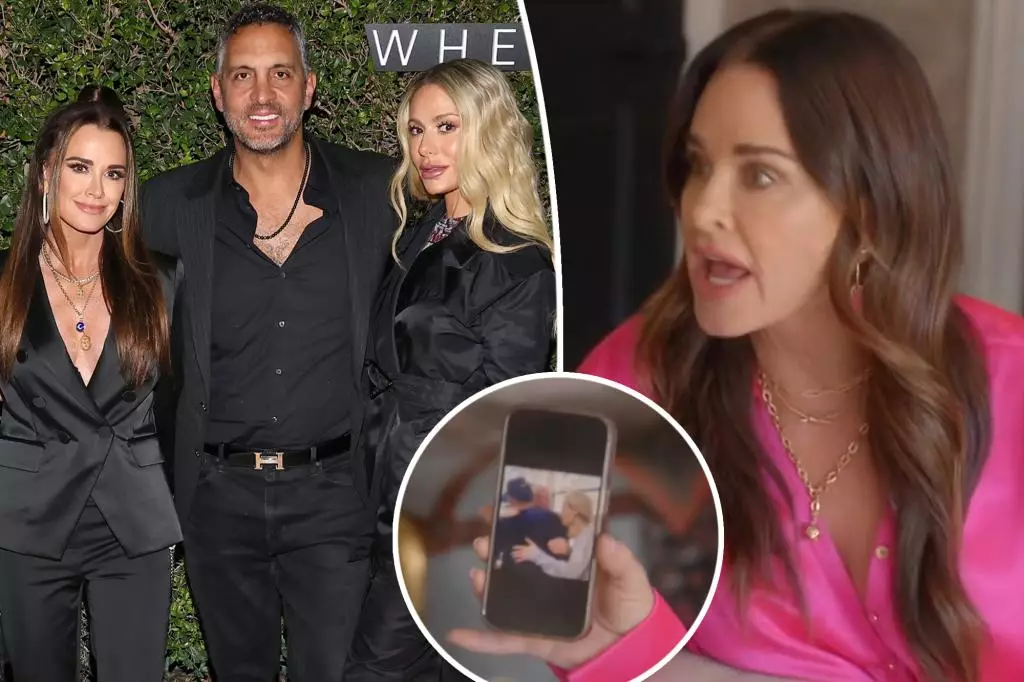Reality television frequently blurs the lines between genuine relationships and scripted drama, especially in popular shows like “The Real Housewives of Beverly Hills.” A recent episode sparked substantial debate and online chatter after Kyle Richards highlighted an encounter between her estranged husband, Mauricio Umansky, and co-star Dorit Kemsley. This incident illustrates how fleeting moments on camera can escalate into public speculation and personal strife, inviting a deeper exploration of trust, loyalty, and public perception on reality TV.
The episode in question escalates rapidly when Bozoma Saint John, a guest on the show, confronts Richards regarding her decision to maintain contact with Kemsley’s estranged husband, Paul “PK” Kemsley. Richards, 56, vigorously defends her choice, asserting her communication with PK revolves solely around “stupid memes.” This banal explanation does nothing to alleviate the undercurrents of tension, especially as she takes the opportunity to ridicule Kemsley’s connection to Umansky by showcasing a seemingly innocuous image from a past episode, which depicts Dorit being overtly affectionate toward Mauricio.
This particular moment embodies the theme of perception in reality television. Richards’s reference to the “stupid rumor” surrounding Dorit’s behavior vis-à-vis Mauricio indicates how viewers can quickly misconstrue friendly interactions as something more complicated. By publicly bringing this detail to light, Richards is both defending herself against accusations while simultaneously dragging Dorit into the fray, rekindling old tensions without necessarily reaching a resolution.
Rumors can swirl like wildfires in today’s social media landscape, leading to misinformation and mounting scandal. This dynamic was evident when Dorit found herself needing to dispel speculations about her motives, emphasizing how hurtful such narratives can be, particularly when they involve children—her kids affectionately referring to Richards and Umansky as “auntie” and “uncle.”
The past year has not been kind to the friendship between Richards and Dorit. Following an emotionally charged reunion filming for Season 13, the two found themselves on opposing sides of what can be perceived as a deep betrayal. Dorit accused Richards of sending her a “manipulative” text, which Richards subsequently became upset over due to its airing within the show’s context, thus magnifying misunderstandings between them. This fracture demonstrates how the pressures of reality television can exacerbate personal relationship issues, leading to extended periods of silence and resentment.
Despite efforts to mend fences in the current season, their interactions devolve into heated confrontations rather than heartfelt reconciliations. The depiction of their relationship reflects the fragility of friendship in stressful environments and serves as a reminder that shared experiences can quickly turn sour under the lens of reality TV.
As audiences tune in weekly, they witness the evolving dynamics of human relationships exacerbated by public scrutiny. The aftershocks of Richards and Kemsley’s arguments echo broader themes that resonate with viewers: the impact of gossip, the challenge of maintaining authenticity while in the limelight, and the struggle for emotional support amidst personal crises.
Ultimately, “The Real Housewives of Beverly Hills” serves not only as entertainment but as a cultural commentary on modern friendship, trust, and betrayal within the intricate web of social interaction. Each episode encapsulates the journey of individuals navigating their personal struggles while under the relentless gaze of cameras, making it imperative for viewers to approach such spectacles with a blend of fascination and critical thought.
The narrative surrounding Richards and Kemsley underscores the complex interplay of friendships, misunderstandings, and societal expectations found within reality television. Although it presents challenges, it also offers relatable commentary about the human experience and the often tumultuous nature of relationships. As the drama unfolds, viewers are left with questions about the authenticity of the connections shown on-screen and the true nature of reality in such curated environments.


Leave a Reply